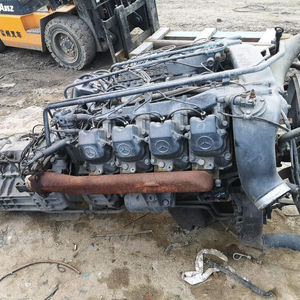Enhancing Your Vehicle's Performance with Import Engines
An Extensive Comparison of Various Kinds of Import Engines and Their Applications in Numerous Vehicles
As the automobile market proceeds to advance, the selection of engines for vehicles becomes progressively diverse, each offering special advantages and applications. From the performance of turbocharged engines to the environmental friendliness of electric powertrains, the spectrum of import engines available in today's market accommodates a large selection of driving demands and preferences. Whether it's the torque of a diesel engine or the non-traditional style of a rotary engine, comprehending the nuances of each type and how they align with particular car demands can substantially influence efficiency, gas economic climate, and general driving experience. By discovering the ins and outs of these import engines and their applications in numerous lorries, a more clear image emerges of the elaborate balance between technology, performance, and sustainability in the modern-day vehicle landscape.
Turbocharged Engines
Turbocharged engines, understood for their capability to boost power outcome efficiently, have actually become significantly common in modern lorry styles. By utilizing exhaust gases to drive a generator that compresses inbound air into the engine, turbochargers effectively boost the amount of air and gas mixture that can be ignited, resulting in boosted performance without substantially increasing engine dimension. This technology allows suppliers to downsize engines, leading to much better fuel effectiveness while maintaining power degrees equivalent to bigger, naturally aspirated engines.

Crossbreed Engines
With the innovations in engine modern technology facilitating boosted efficiency and effectiveness, the vehicle market has seen a rise in the integration of crossbreed engines as a lasting remedy for power distribution. Crossbreed engines integrate the benefits of both internal burning engines and electrical motors to supply improved fuel performance and minimized discharges. By perfectly switching in between both power resources or utilizing them at the same time, hybrid engines offer convenience in different driving conditions.

Additionally, hybrid technology is not restricted to a particular vehicle kind, with applications ranging from compact cars to bigger SUVs and even high-performance cars. As environmental issues and fuel effectiveness policies end up being significantly popular, hybrid engines stand for a significant action towards sustainable transport solutions.
Electric Engines
Electric engines have reinvented the automotive market with their efficient and environmentally-friendly power distribution systems. import engines. These engines operate by converting electric power into power, offering a smooth and quiet driving experience. Unlike traditional burning engines, electrical engines create absolutely no tailpipe emissions, decreasing the total carbon footprint of cars and aiding combat air pollution
Among the key advantages of electrical engines is their high power efficiency, usually transforming over 80% of the electric power into propulsion. This efficiency converts into expense savings for Check This Out customers via lowered gas expenses. Additionally, electric engines call for less upkeep contrasted to internal burning engines, as they navigate here have fewer relocating parts that can wear out with time.
Electric engines are frequently made use of in electric automobiles (EVs) and crossbreed electric automobiles (HEVs) On the various other hand, HEVs incorporate electric engines with conventional internal combustion engines to maximize fuel performance and reduce discharges.
Diesel Motor
Diesel motor are renowned for their outstanding gas performance and robust efficiency in a variety of vehicle applications. These engines operate by pressing air in the cylinders, which leads to heats that spark the injected gasoline without the need for ignition system. This burning method gives diesel engines with higher torque outputs contrasted to gas engines, making them suitable for sturdy automobiles like vehicles, buses, and building and construction equipment.
Among the key benefits of diesel motor is their premium gas effectiveness, as they can take a trip farther on a gallon of gas compared to gasoline engines. This efficiency is particularly advantageous for long-haul transport and business fleets, where lowering fuel costs is a substantial factor. In addition, diesel motor are known for their resilience and longevity, calling for much less maintenance over their lifespan compared to gasoline engines.
Recently, developments in diesel motor technology have actually additionally concentrated on lowering discharges to fulfill rigorous environmental laws. Modern diesel engines are outfitted with sophisticated discharges regulate systems, such as diesel particle filters and discerning catalytic decrease, which assist lessen pollutants launched into the environment - import engines. These growths have made diesel engines cleaner and a lot more ecologically pleasant while maintaining their efficiency and performance attributes
Rotating Engines
Popular for their one-of-a-kind style and performance features, rotating engines offer an unique option to traditional combustion engine innovations like diesel engines. These engines, additionally known as Wankel engines, operate on a different concept contrasted to conventional piston engines.

Final Thought
To conclude, the contrast of various kinds of import engines highlights the diversity of options readily available for different cars. Turbocharged engines provide enhanced power and efficiency, crossbreed engines integrate conventional link and electric source of power for improved gas economic situation, electrical engines offer a tidy and sustainable option, diesel engines are recognized for their toughness and torque, and rotary engines offer a special design with possibility for high performance. Each engine type has its very own strengths and applications in the auto market.
In addition, hybrid engines add to a quieter driving experience and frequently give a smoother acceleration contrasted to conventional inner combustion engines.
Renowned for their special design and efficiency characteristics, rotating engines offer an unique choice to conventional burning engine technologies like diesel engines. These engines, additionally known as Wankel engines, operate on a various principle compared to standard piston engines. Despite these restrictions, rotating engines continue to draw in makers and enthusiasts looking for a different engine innovation with distinct advantages.
Turbocharged engines use raised power and efficiency, hybrid engines incorporate traditional and electric power sources for enhanced gas economy, electric engines supply a clean and sustainable alternative, diesel engines are known for their toughness and torque, and rotating engines offer a distinct style with possibility for high efficiency.